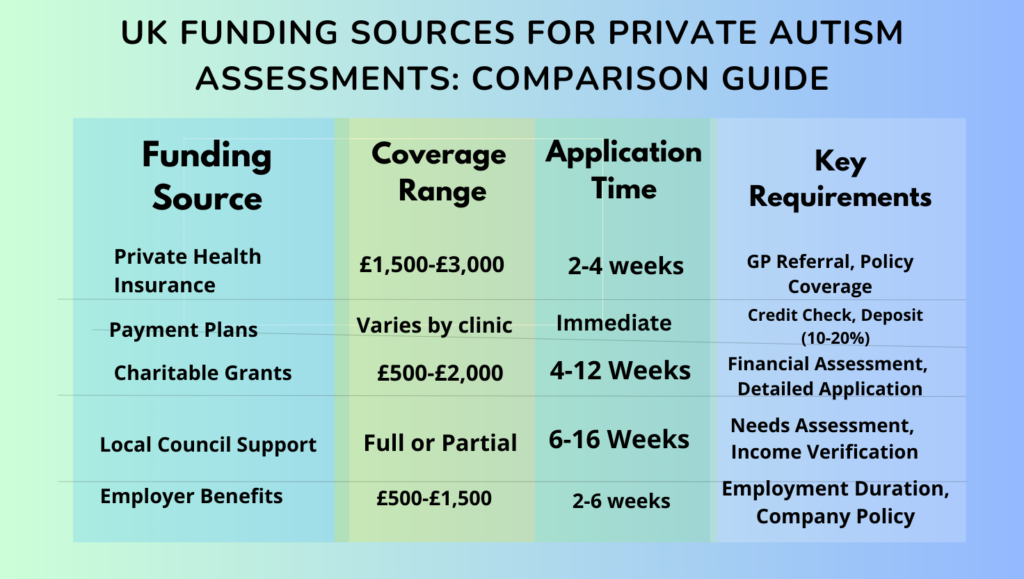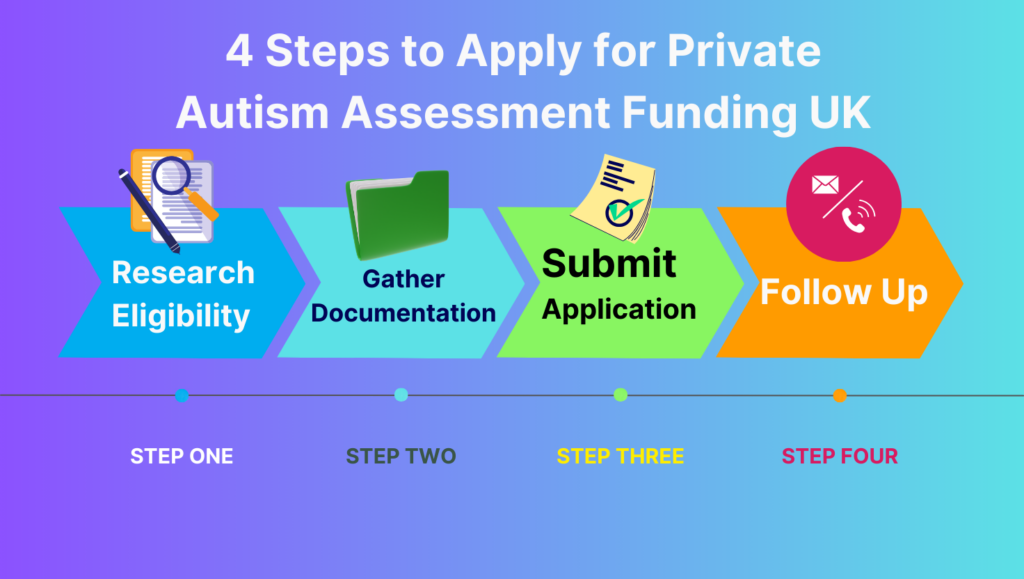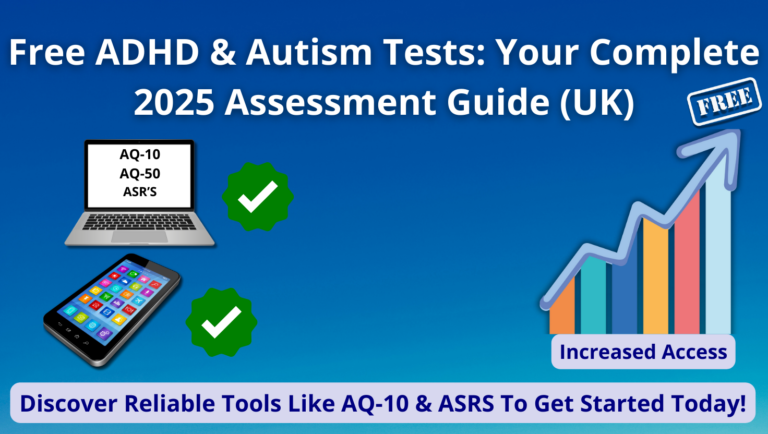Funding for Private Autism Assessments UK: Guide 2025

Key Takeaways
Funding for private autism assessments in the UK: A comprehensive guide to costs, options and support. Private assessments range from £1,500-£3,000, offering results in 4-6 weeks versus 12+ month NHS waits.
Here are your key funding options:
- Health Insurance: Providers like Bupa, AXA, and Vitality often cover assessments
- Payment Plans: Most clinics offer 3-12 month installments
- Charitable Support: National Autistic Society provides assessment grants
- Local Council Help: Based on financial circumstances
- Workplace Benefits: Many employers offer healthcare assistance
Essential Tips:
- Get multiple clinic quotes
- Combine funding sources when possible
- Maintain organized documentation
- Write detailed applications
- Note: NHS accepts private diagnoses
These funding pathways help UK families access faster autism assessments while managing costs effectively.
Autism Assessment Resources
Right to Choose for Autism Assessments: https://specialneedsresourcesdirectory.co.uk/right-to-choose-autism-assessments-uk/
National Autistic Society (NAS): https://www.autism.org.uk/ – Offers comprehensive advice and resources on autism, including potential funding avenues.
Ambitious About Autism: https://www.ambitiousaboutautism.org.uk/ – Provides support, services, and education for children and young people with autism.
NHS information on autism: https://www.nhs.uk/conditions/autism/ – Provides comprehensive information about autism spectrum disorder.
Contact a Family: https://contact.org.uk/ – Provides advice, information, and support to families with disabled children, including those with autism.
Introduction
Autism assessments are crucial in understanding the needs of individuals on the spectrum.
While NHS assessments often come with long waiting times, many families turn to private services to get the diagnosis sooner.
But how can you fund a private autism assessment in the UK?
With growing awareness of autism and the increasing demand for faster evaluations, it’s more important than ever to know your financial options.
In this article, we’ll guide you through various funding options available for private autism assessments, from health insurance to charitable support.
Don’t let financial concerns stand in your way—learn how to secure the funding you need!
What Are the Different Ways to Get Funding for a Private Autism Assessment in the UK?
A private autism assessment offers a comprehensive evaluation by specialists to determine if an individual meets the criteria for Autism Spectrum Disorder (ASD).
Unlike the standard NHS process, these assessments involve detailed tests, observations and interviews with key individuals like parents and teachers, providing a thorough understanding of behavior, communication and social development.
Beyond faster appointment times and avoiding NHS waiting lists, private assessments offer the significant advantage of personalized attention.
Specialists have ample time and resources for in-depth evaluations, leading to more accurate and timely diagnoses.
This allows families to access crucial early interventions, therapies, and educational support sooner, maximizing the potential for improved communication, social skills and overall quality of life.
While involving an upfront cost, the long-term benefits of a private assessment—including individualized care and quicker access to support—make it a worthwhile investment.
Therefore, understanding your options for funding for private autism assessment UK is essential.
Exploring avenues such as health insurance, charities, and local council support can significantly ease the financial burden and ensure your child receives the necessary support without delay.
Funding Options for Private Autism Assessments in the UK

Paying for a private autism assessment can be expensive, but you have several options to explore that can make the cost more manageable.
Whether it’s through health insurance, personal savings, charity funding or local council support, you don’t have to carry the financial burden alone.
Let’s break down the most common ways to fund a private assessment.
Does Private Health Insurance Cover Funding for a Private Autism Assessment in the UK?
Private health insurance is often the first place families turn to when seeking funding for autism assessments.
Some insurance providers, such as Bupa, AXA, and Vitality, include autism assessments in their plans. However, it’s important to check the fine print, as not all plans automatically cover this service.
You may need a referral from your GP or a specialist, and the assessment may only be covered if it’s carried out by a specific clinic.
To find out if your policy covers autism assessments, take a look at the details of your health plan or reach out to your insurer directly.
Be sure to ask about any potential restrictions, required documentation, or additional steps you may need to take.
It’s always better to be informed beforehand, so you don’t run into unexpected roadblocks.
How Can I Use Savings or Payment Plans to Fund a Private Autism Assessment in the UK?
If insurance doesn’t cover the cost of the assessment, you might need to turn to your personal savings.
I know it’s not easy, especially when the price of assessments can be steep, but breaking down the cost into smaller savings goals can help.
Take a look at your monthly budget and see where you might cut back and put those savings towards the assessment.
Another option is payment plans.
Many clinics offer flexible payment options, where you can spread the cost over several months, which makes the process less overwhelming.
Some might require a deposit upfront, but then the remaining balance can be paid in manageable instalments.
This can be a lifesaver if you’re trying to make the cost more affordable without dipping into your savings all at once.
Are There Charities or Grants That Help Fund Private Autism Assessments in the UK?
You may also be able to get financial help from charities. Several organisations in the UK provide grants or guidance for autism assessments.
For example, the National Autistic Society (NAS) is a fantastic resource, offering advice on how to access funding and grants.
Local charities and autism support organisations may also have funding available, so it’s worth reaching out to see what’s on offer.
Applying for a grant can feel like a lot of paperwork, but it’s worth the effort if it helps reduce the financial strain.
The application process typically requires you to explain your financial situation and why the assessment is necessary for your child’s development.
Be sure to take your time and provide clear, detailed information to improve your chances.
Can I Get Help from My Local Council to Fund a Private Autism Assessment in the UK?
Some local councils in the UK offer government-backed funds to assist with healthcare costs, including autism assessments.
The availability of this funding depends on your local authority’s rules and eligibility criteria, so it’s worth contacting them directly to find out what’s available in your area.
To apply for funding through your local council, you’ll need to demonstrate your eligibility, usually by providing proof of income or showing that you’re experiencing financial hardship.
The application process can sometimes take a while, but don’t get discouraged.
A well-prepared application can help speed things up, and many councils are willing to offer financial assistance to those in need.
Final Thoughts
Securing funding for a private autism assessment can be a bit of a maze, but there are plenty of options to help make it more affordable.
From health insurance and payment plans to charity grants and local council support, there’s no shortage of potential sources to explore.
The most important thing is to be persistent, stay organised and reach out for help when you need it.
After all, your child’s future is too important to let funding be a barrier to getting the support they deserve.
Keep exploring all your options and take the steps needed to make the assessment happen.
How Do I Apply for Funding for a Private Autism Assessment in the UK?

Applying for funding for a private autism assessment in the UK can seem like a complex process, but breaking it down into steps makes it much more manageable.
Whether you’re looking into charity grants, health insurance coverage, or local council support, there are several paths to explore.
Here’s a simple guide to help you navigate the application process and secure the funding you need.
Step 1: Applying for Charity Funding or Grants
Charities play a significant role in helping families secure funding for private autism assessments in the UK.
The first step is identifying organisations that offer financial assistance for autism assessments.
Leading charities like the National Autistic Society (NAS) and Ambitious about Autism often have funding options available, or they can point you toward local grants that might be accessible.
Once you’ve found a charity, visit their website for more details on how to apply for funding.
You’ll likely need to fill out an application form and provide some information about your financial situation and why you need the assessment.
Supporting documents, such as income statements or proof of financial hardship, will help strengthen your application.
Remember, applying for charity funding can be competitive, but many families have successfully received grants.
Stay persistent, and don’t hesitate to reach out to multiple organisations.
Step 2: How to Approach Health Insurers for Coverage
Private health insurance is another option to consider when looking for funding for private autism assessments in the UK.
Some health insurance providers, like Bupa, AXA, and Vitality, include autism assessments as part of their coverage.
However, not all plans automatically include this, so it’s important to check the specifics of your policy.
To get started, review the terms of your health insurance policy to see if it covers diagnostic services for autism.
If you’re unsure, contact your provider directly to confirm whether an autism assessment is covered.
Some insurers may require a referral from a GP or specialist, so make sure to ask about any extra steps or documentation needed to access the coverage.
Understanding your insurance options can make a big difference in securing funding for private autism assessments in the UK without putting too much strain on your finances.
Step 3: Navigating Local Council Support and Applying for Social Care Assessments
In addition to charities and insurance, your local council can offer support for funding a private autism assessment.
Many local authorities provide financial assistance to families with autism-related healthcare needs, although each council has its criteria and processes.
To start, contact your local council to find out if they offer funding for private autism assessments in the UK.
You may need to provide proof of income, financial hardship, or other supporting documents to demonstrate your eligibility.
Councils may also provide social care assessments, which can help fund additional services following a diagnosis.
It’s important to be prepared for a lengthy application process, as some councils may have waiting lists or specific requirements.
However, local council support can be a valuable resource, especially if other funding options aren’t available to you.
Step 4: Tips on Writing a Compelling Funding Application
When applying for funding for private autism assessments in the UK, it’s essential to make your application stand out.
Here are some tips to help you write a strong, compelling application:
- Be clear and specific: Explain why the assessment is needed and how it will benefit your child. Be as specific as possible about your child’s challenges and how early diagnosis can provide better support.
- Provide all necessary documentation: Whether you’re applying for charity funding or insurance coverage, make sure to include all required documents. This might include proof of income, referral letters, or medical reports.
- Tell your story: Personalising your application can make it more impactful. Share your family’s experience and why this assessment is crucial for your child’s development.
- Follow the instructions: Carefully read the guidelines provided by the funding organisation or insurance company. Missing documents or incorrect information can delay the process.
- Don’t give up: If your first application isn’t successful, try again! Many organisations allow you to resubmit applications or provide additional information.
Final Thoughts
Securing funding for private autism assessments in the UK may take time and persistence, but there are several options available to help ease the financial burden.
Whether it’s applying for charity grants, using health insurance, or seeking support from your local council, exploring all available resources can make a significant difference.
Take the time to prepare your application carefully, and don’t hesitate to ask for help.
Your child’s future is worth the effort, and with the right support, you can make the process smoother for your family.
What Other Ways Can I Fund a Private Autism Assessment in the UK?
Securing funding for a private autism assessment can sometimes require thinking outside the box.
In addition to traditional routes like health insurance or charity funding, there are some creative options that might help ease the financial burden.
Crowdfunding and employer assistance are two alternatives worth considering.
Can I Use Crowdfunding to Pay for a Private Autism Assessment in the UK?
Crowdfunding has become a popular way to raise money for medical expenses, including private autism assessments.
Platforms like GoFundMe, JustGiving, and Crowdfunder allow you to create a campaign and share it with your network, asking for donations to help fund the assessment.
The great thing about crowdfunding is that it taps into your community’s generosity and you don’t have to rely solely on savings or insurance.
To create a successful crowdfunding campaign, it’s important to tell a compelling story.
Be open and honest about your child’s needs, explaining why the autism assessment is crucial for their development.
Share how an early diagnosis will make a difference, and let people know exactly how the funds will be used.
Adding photos or videos can help create an emotional connection and encourage people to donate.
When sharing your campaign, use social media to reach as many people as possible, and don’t hesitate to ask friends and family to spread the word.
Be sure to thank your donors regularly and keep them updated on your progress.
Crowdfunding can be an excellent way to gather funds, but it requires a bit of effort and community support to succeed.
Can My Employer Help Cover the Cost of a Private Autism Assessment in the UK?
You might be surprised to learn that your employer could help with the cost of a private autism assessment.
Many workplaces offer benefits and schemes that could include funding for healthcare-related expenses.
While this may not be something that is widely advertised, it’s worth checking with your HR department to see if any options are available to you.
Workplaces often have flexible benefits schemes or wellness programs that allow employees to access funding for medical expenses.
Some employers may offer support through employee assistance programs (EAPs) that cover family-related needs, or they might provide financial help for specific medical assessments.
If your employer offers a health reimbursement account (HRA) or similar options, these funds might be used for the assessment cost.
To request help from your employer or HR department, start by reviewing your employee benefits package to see if there are any relevant programs.
Then, have a direct conversation with your HR representative, explaining your situation and asking if the company offers any assistance for private autism assessments.
While it might feel uncomfortable to bring this up, it’s worth asking, as many employers are willing to help their employees when they’re facing challenges like this.
Final Thoughts
When it comes to securing funding for a private autism assessment, it’s important to explore all available avenues, even those you might not initially consider.
Crowdfunding and employer assistance can provide the financial support you need, in addition to traditional funding routes.
Whether you’re sharing your story online or requesting help from your employer, these options can offer significant relief when it comes to funding an autism assessment.
Be proactive, and don’t be afraid to ask for the support you need—it could make all the difference for your child’s future.
Frequently Asked Questions
Conclusion
Funding a private autism assessment may seem daunting, but there are numerous options to explore!
Whether it’s through health insurance, charities, crowdfunding, or local council support, getting the help you need is possible.
Remember to explore all avenues and don’t hesitate to seek guidance on the application processes.
The quicker you can secure the funds, the sooner your loved one can get the support they deserve.
Start today by exploring your options, and take the first step towards understanding and supporting your child’s or loved one’s needs.
About the Authors: Dwayne and Charlene are committed to providing accessible and reliable information to families with special needs. Charlene’s extensive experience working with children of all abilities as a professional childminder combines with Dwayne’s personal journey as a father to their son with autism to provide families with a deep understanding of the issues families face. Together, they offer practical guidance and support.




